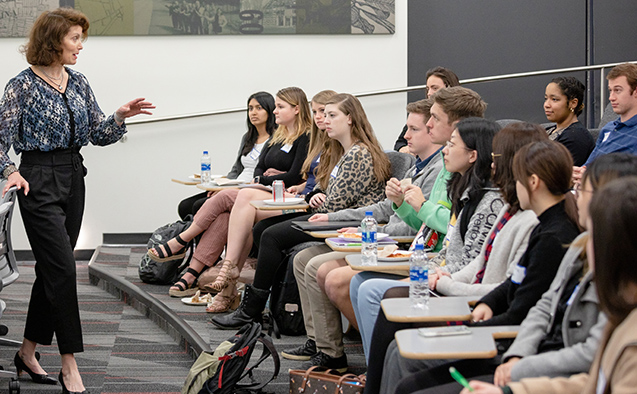Forget the ‘i’ word, focus on skill-building instead

The economy and social distancing are changing summer internships. Here’s how undergrads can get the work experience they need to build their resumes.
According to Wake Forest’s Assistant Vice President for Career Education & Coaching Heidi Robinson, focusing on project-specific work and short-term assignments can be a win-win for both students and organizations whose staffing needs for summer may be different than expected.
“I’ve been telling students to forget the “i” word. Instead of seeking six- to eight-week formal internships, talk to employers and organizations, like non-profits, about gaining work experience. Taking on project-based work in either one or several industries can beef up a resume and show initiative,” Robinson says.
Small companies and nonprofits, in particular, may need help with inventory or market research or a communications project that can be done remotely. Robinson tells students that whatever their summer work, they can add to their network and build skills for their next job. These may include writing or technical experience, but also soft skills such as empathy, patience and perseverance.
“Most students assume they are the only one who hasn’t landed summer work experience. That idea is not reality.” Heidi Robinson, assistant vice president for career education & coaching
Finding these opportunities may feel daunting, so Robinson helps by meeting with groups of students. She joins in on regularly scheduled Zoom or WebEx gatherings with Wake Forest student organizations, fraternity and sorority chapters and ROTC groups, offering support and sharing a checklist of proactive steps that help them remain flexible.
Part of her career coaching strategy is to have students create a visual representation of their supporters. They start by writing down their name on a sheet of paper. Next, they surround their name with the names of people they know who have a vested interest in their success. These might be family members or parents of their friends or former supervisors. Finally, they order the people in their network by the date they will reach out to each one by phone.
“I can see in their faces as we do this exercise that their anxiety levels go down. The students feel more confident knowing they have options to explore,” Robinson says. “They have a checklist and an action plan.”
The two questions Robinson says students need to ask during these phone conversations are: What advice do you have for me in getting work experience in your field? Who are other people I should be having this conversation with?
“Networking and relationship building are critical skills to keep in your toolbox whether the economy is hot or not,” says Robinson. “Students are often surprised by how many people are eager to help when they are asked.”
Wake Forest University’s award-winning Office of Personal and Career Development is celebrating 10 years of preparing students for their lifelong career journey, not just getting a first job after college.
Categories: Mentorship, Personal & Career Development
Wake Forest News
336.758.5237
media@wfu.edu
Meet the News Team
Wake Forest in the News
Wake Forest regularly appears in media outlets around the world.




